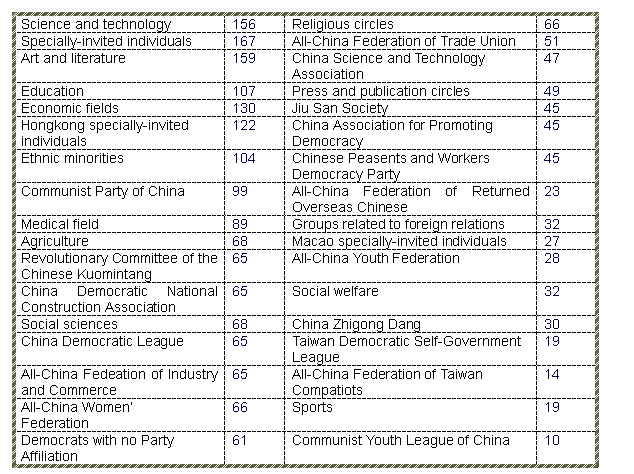The Chinese People's Political Consultative Conference (CPPCC) is a patriotic united front organization of the Chinese people, serving as a key mechanism formulti-party cooperation and political consultation under the leadership of the Communist Party of China (CPC), and a major manifestation of socialist democracy.
At present, the CPPCC consists of representatives of the CPC and non-Communist parties, personages without party affiliation, representatives of people's organizations, national minorities andall social strata. It also has the representation of compatriots of the Hong Kong Special Administrative Region, the Macao Special Administrative Region and Taiwan, returned overseas Chinese, and specially invited people.
The main functions of the CPPCC are to conduct political consultation, exercise democratic supervision and participate in the discussion and the handling of state affairs.
Political consultation covers major principles and policies proposed by the central and local governments and matters of majorimportance concerning political, economic, cultural and social affairs.
Democratic supervision means to exercise, by means of offering suggestions and criticisms, supervision over the implementation ofthe Constitution, other laws, regulations and major policies, and over the work of government agencies and their functionaries.
Participation in the discussion and the handling of state affairs means to organize CPPCC members of various parties, people's organizations, various minority people and other social groups to take part in the country's political, economic, cultural and social activities in whatever way they think fit.
The current CPPCC is also known as new Political Consultative Conference as distinguished from the one convened in 1946 following the victory of the War of Resistance against Japanese Aggression upon the decision taken by the CPC and the Kuomintang in their negotiations in Chongqing as part of the preparations forthe formation of a new government. But hardly before the old CPPCCbegan to function when it was disintegrated in November of the same year when the Kuomintang betrayed the resolutions of the conference and unilaterally proclaimed the convocation of a "National Assembly".
The first session of the new CPPCC was held in Beijing in September 1949.
Authorized to perform the functions of the supreme organ of power, the session adopted a "Common Program"which bore the natureof a temporary constitution, proclaimed the founding of the People's Republic of China (PRC), elected a council of the Central People's Government with Mao Zedong as the chairman, and elected the First National Committee of the CPPCC.
The CPPCC ceased to act as the supreme organ of power in September 1954 when the National People's Congress was convened. Instead, it shifted its functions as China's patriotic united front organization for its broad representation. It has ever sinceplayed a vital role in the country's political, economic, culturaland social affairs and in international exchanges.
The CPPCC has a National Committee and local committees. With afunctioning term of five years,they meet once every year.
The First Session of the 10th National Committee of the CPPCC is scheduled to open in Beijing on March 3. The following chart shows "Members of the 10th National Committee of CPPCC by representative areas."
 Chairman of the 9th National Committee: Li Ruihuan
Chairman of the 9th National Committee: Li Ruihuan
Vice-Chairpersons:
Ye Xuanping Yang Rudai Wang Zhaoguo Ngapoi Ngawang Jigme
Luo Haocai Ba Jin Qian Weichang Ren Jianxin Song Jian
Li Guixian Chen Junsheng Zhang Siqing Qian Zhengying Ding Guangxun
Sun Fuling Henry Ying Tung Fok Ma Man Kei Zhu Guangya Wan Guoquan
Hu Qili Chen Jinhua Zhao Nanqi Mao Zhiyong Bai Lichen Jing Shuping
Zhang Kehui Zhou Tienong Wang Wenyuan
Secretary-general: Zheng Wantong
|















